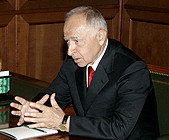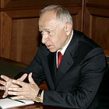
Uncertainty Over Who Will Lead Dagestan Puts the Volatile Republic Further on Edge
Publication: Eurasia Daily Monitor Volume: 7 Issue: 16
By:

On January 21, public protest action took place in the southern Dagestani city of Derbent. The estimated 2,000 protestors demanded the resignation of the current mayor of the city, Feliks Kaziahmedov, and a new mayoral election.
The mayoral election that took place in Derbent in October 2009 quickly became known throughout Russia as profoundly fraudulent. In December, a Dagestani municipal court overturned the results of the Derbent mayoral election, and that ruling was upheld by Dagestan’s Supreme Court. President Dmitry Medvedev himself addressed the issue, backing the Dagestani courts’ rulings (www.kavkaz-uzel.ru, January 21).
The Dagestani courts’ decisions and their backing by the Russian leadership are seen as a defeat for the current president of Dagestan, Mukhu Aliev, whose presidential term ends on February 20. At the same time, the acting mayor of the city, who is believed to be Aliev’s protégé, has not left his position, which suggests that the scramble for power in Dagestan is not over yet.
The gridlock in Derbent has been accompanied by extraordinary excitement in Dagestan over the possible change of leadership in the republic. The official procedure of appointing the president of Dagestan is broken, given that the Russian president did not announce the name of the new republican president by January 20, as the law required him to do.
Novaya Gazeta reported on January 20 that the press-service of President Medvedev did not know when the candidacy for the leadership of Dagestan would be named. The paper also reported an unconfirmed report that Medvedev had come up with the new head of Dagestan and asked Aliev to “take heart.” According to the paper, the deputy head of the Dagestani government, Magomed Abdullaev, is destined to become Dagestan’s president, while another person from the pool of candidates, Dagestani parliament member Magomedsalam Magomedov, is to head the republican government.
Abdullaev, a St. Petersburg educated legal expert, advanced quickly within the Dagestani government, as he was allegedly promoted by President Medvedev himself. Abdullaev is thought to have been doing his legal doctoral studies at St. Petersburg State University at the same time as the future President Medvedev was teaching classes there (www.kavkaz-uzel.ru, January 19).
The actual candidates for the leadership of Dagestan perhaps matter less than the circumstances surrounding the process of this appointment.
On January 22 an authoritative Dagestani weekly, Novoe Delo, reported that at a meeting between President Medvedev and Mukhu Aliev on January 11, Medvedev offered Aliev “another job” and named Magomed Abduallaev, along with Magomedsalam Magomedov, as possible candidates to succeed him. Aliev countered Medvedev’s proposal, calling these candidacies “the most wrongful and ruinous” for Dagestan.
Furthermore, the report claims, the delay in appointing a new Dagestani leader is the result of a disagreement over personalities between President Medvedev and Prime Minister Vladimir Putin. There is no independent and reliable confirmation about such differences between Medvedev and Putin. Yet it is perhaps the best explanation for the fact that a volatile region like Dagestan is kept in the dark about its leadership beyond the given timeframe. This also explains the lengthy waiting period for the announcement of the president’s envoy to the new North Caucasus Federal District, who was appointed two months after Medvedev announced the new position.
Putin’s astounding rise to power began with the war in Chechnya in 1999. This suggests that the state of affairs in the North Caucasus has special importance for Putin’s political standing and Russian public opinion. The deteriorating security situation in the region may have given Medvedev a valuable political tool to offer an alternative strategy in the North Caucasus and curb the influence of the all-powerful Russian prime minister.
Novoe Delo enumerated Mukhu Aliev’s mistakes that made it problematic for him to be reappointed as the head of Dagestan. The paper claims that Aliev started arguing about the water distribution agreement between Russia and Azerbaijan, which affected Dagestan’s interests during an official visit of President Medvedev to Baku in June 2009. Aliev and Russian Foreign Minister Sergei Lavrov had a row over the issue later in Moscow. Aliev managed to spoil relations with Russian Deputy Prime Minister Victor Zubkov and his son-in-law, Russian Defense Minister Anatoly Serdyukov. More significantly, Aliev allegedly had a falling out with the billionaire Suleiman Kerimov, who is from Dagestan and is of Lezgin decent. Kerimov, possibly acting with the Kremlin’s tacit approval, tried to attract the capital of such Russian oligarchs like Mikhail Prokhorov of Onexim Group to Dagestan. Aliev blocked these attempts, as he did not preside over these investments and therefore felt he was losing control over financial flows and, ultimately, over the republic itself.
Now, with Aleksandr Khloponin having become the president’s envoy to the newly designated North Caucasus Federal District, of which Dagestan is a part, things may go particularly badly for Aliev. Khloponin, Prokhorov and Kerimov are thought to be close associates. Following the surprising appointment of Khloponin as head of the new North Caucasian district, some observers concluded that the Kremlin was giving carte blanche to the Russian oligarchs to transform the region.
Even though Mukhu Aliev appears to be cornered, he still has some cards to play. On December 29, a scheduled session of the Dagestani parliament was suddenly postponed due to the absence of a quorum. Numerous reports suggested that Aliev’s supporters deliberately left the assembly to avoid having to vote for a candidate for the president of Dagestan. According to Russian law, regional assemblies vote to confirm or reject the candidacies that are put forward by Russia’s president.
As Dagestan is the biggest and the most multiethnic republic in the North Caucasus, the situation in this republic will have a significant impact on the overall situation in the region and how things fare in the North Caucasus Federal District. So Moscow is likely to weigh the change of leadership in the republic very carefully.




